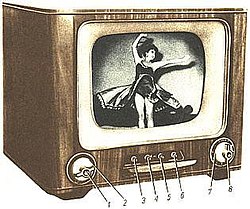Analog television
Analog television is broadcasting television programming using analog signals.[1] Before digital television, all broadcasters used analog signals.
Analog television can be wireless or can be over a cable television network.
Many countries have changed from analog to digital television. Others are in the process of changing, and some have not started changing.
The current deadline for "low power" TV stations in the United States to switch to digital television is July 13th 2021, over 60 years after analog was first made. The full power stations already switched in the months between February 12th and July 12th 2009.
Switchover to digital TV
In 2008, the FCC in the US said that all full power stations needed to switch to digital by the 13th February 2009.[2] Most had already been running digital channels alongside the analog version. Satellite, cable, and users with low power did not need to make the change at the time. The FCC gave people up to 2 $40 coupons to buy converter boxes between January 2008 and March 2009.
In the UK, regions began changing to digital terrestrial television in 2007. The regional phase ended in 2012. Northern Ireland was the last place to replace analog in the UK on the morning of 24th of October 2012.
Some people were worried that because some digital channels didn't have subtitles, that some people would have difficulty understanding what was happening. The London Olympic Games were meant to be held soon, which also made people worried that the timetable would affect people's ability to watch it if they did not make the switch completely.
Meanwhile in the US, 2 years after all of the full power analog TV stations were shut down, the FCC, on July 15, 2011 made the date for low power television. Stations on channels 52 to 69 had to shut down or leave those channels by December 31, 2011, and all analog television transmitters needed to shut down by September 1, 2015.[3] The FCC said, on May 17 of 2017, that all analog low-power stations and transmitters must convert by July 13, 2021.[4] The last ones were in Alaska, and converted in January 2022.[5]
Analog Television Media
Analog television system by nation
- Raster-scan.svg
Raster scanning is performed from left-to-right and top-to-bottom. Once the screen has been scanned, the beam returns to the beginning of the first line.
- TV screen close-up.jpg
Close up image of analog color screen
- Video-line.svg
Colour composite video signal illustration
NTSC composite video signal (analog)
Portion of a PAL video signal. From left to right: end of a video scan line, front porch, horizontal sync pulse, back porch with colorburst, and beginning of next line
Color bar generator test signal
Related pages
References
- ↑ "Television technical performance code" (PDF). Ofcom. December 2006. Retrieved December 6, 2014.
- ↑ "The End of Analog Television". www.mediacollege.com. Retrieved 2021-01-31.
- ↑ "FCC 11–110 Second Report and Order" (PDF). Archived from the original (PDF) on March 14, 2012. Retrieved July 23, 2011.
- ↑ FCC Public Notice: "The incentive auction task force and media bureau announce procedures for low power television, television translator and replacement translator stations during the post-incentive auction transition", May 17, 2017
- ↑ "In the matter of State of Alaska request for waiver" (PDF). Federal Communications Commission. 2021-06-21.




